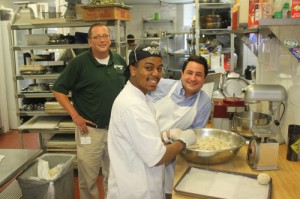
BERLIN — A Worcester County teacher and a well-known local chef will be honored next month by a national organization for their collective work on an innovative public-private program that helps developmentally challenged students transition from the lessons of the classroom to the rigors of the real world, but the biggest winners are surely the students themselves and the communities in which they live and work.
About two years ago, the Worcester Technical High School began its Community Work Experience (CWE) program to help students with various developmental disabilities and other challenges transition to independent, productive lives as adults. Under the direction of the state Board of Education’s Department of Rehabilitative Services (DORS) program, Worcester County’s CWE program is already achieving the desired goals.
Worcester Tech’s CWE program, under the direction of coordinator Matt Elburn, offers its many participants an opportunity to explore various career fields and work experiences while developing the vocational, academic and social skills needed to thrive in the workplace.
Just two years later, Worcester County’s CWE is already gaining national recognition for its early successes. The national Division on Career Development and Transition (DCDT) next month will hold its annual conference in Kansas City, and Elburn will be awarded with the Iva Dean Cook Teacher of the Year Award, bestowed on an educator who has demonstrated outstanding commitment and service to the career education and transition of students with disabilities.
In addition, Hotel Atlantic Chef Leo D’Aleo will receive the Employer of the Year Award at the DCDT conference in Kansas City on Oct. 13. The award goes to an employer or business that has shown remarkable commitment to promoting or providing employment opportunities to students with disabilities. Practically from the outset of the local program, D’Aleo and Hotel Atlantic in Berlin have provided opportunities for some of the program’s early successes, including perhaps CWE’s poster child Craig Mason, a Snow Hill 20-year-old who has transitioned from student to integral part of the Hotel Atlantic’s talented kitchen staff.
At Worcester Tech, CWE students with disabilities begin their transition with vocational training in the classroom before getting practical real world work experiences at various job placements throughout the county. Through the program, students spend much of the day getting classroom training in various career programs from culinary arts, agricultural science, graphic arts, child care and carpentry, for example.
Students then spend a couple of hours each school day at a job placement at one of the many participating businesses from one end of the county to the other in a wide variety of fields. In the beginning, they are often accompanied by a job coach, who helps the students through their designated tasks.
However, in many cases, such as Mason’s, the developmentally challenged student-turned-employee quickly embraces the specific jobs and skills to the point they effectively meld into the workplace. After his training period under the CWE was completed, Mason was hired as a regular employee at the Hotel Atlantic in Berlin where he continues to thrive as an important part of D’Aleo’s team.
The CWE program is for developmentally disabled students ages 16-21, who are working toward a certificate of completion for their high school careers. Thus far, dozens of Worcester Tech students have come through the program with more at the early stage of their transition placement. In addition, the private sector has completely embraced the program with 20 businesses participating.
Elburn approached D’Aleo early on in the program in search of placement opportunities for his culinary arts students. D’Aleo was, at first, a reluctant partner, agreeing to take on a handful of students but uncertain what jobs he could provide beyond obvious menial tasks. However, early on the CWE students at Hotel Atlantic moved quickly passed washing dishes and other tasks and began embracing more hands-on jobs in food preparation.
“At first, I was nervous and apprehensive because I didn’t know how I was going to occupy their time, help with their development and still run my kitchen,” he said. “But the beauty of it is, it’s turned out to have a happy ending. In the beginning, I felt like I had to find tasks for them that were well suited for their unique hurdles, but as they’ve grown in their development, it’s often hard to remember what those hurdles were to begin with.”
Perhaps the best example is Mason, who has proven his skills in Hotel Atlantic’s kitchen and is often trusted with D’Aleo’s most time consuming and intricate recipes.
“He’s gotten faster and his skills have increased exponentially,” he said. “His attitude, work ethic and sense of humor are refreshing. He’s a valuable member of our kitchen crew and nothing was given to him. He has earned everything.”
Moving forward in life is the ultimate goal for all of the students participating in the program, but in many cases, including Mason, the hands-on experience comes with valuable life lessons, according to D’Aleo.
“This program is about lessons for work and maybe more importantly, lessons for life,” he said. “I don’t coddle these kids, because the reality is, life doesn’t coddle you. I can help Craig and the other students develop, but life helps those who help themselves.”
While the reward for the students is the intended goal of the program, there is clearly a reciprocal benefit.
“I almost felt guilty about the satisfaction I’ve gotten out of working with these kids,” said D’Aleo. “I know I’m a better person for it. It continues to take me by surprise and I almost feel like I don’t deserve this accolade.”
